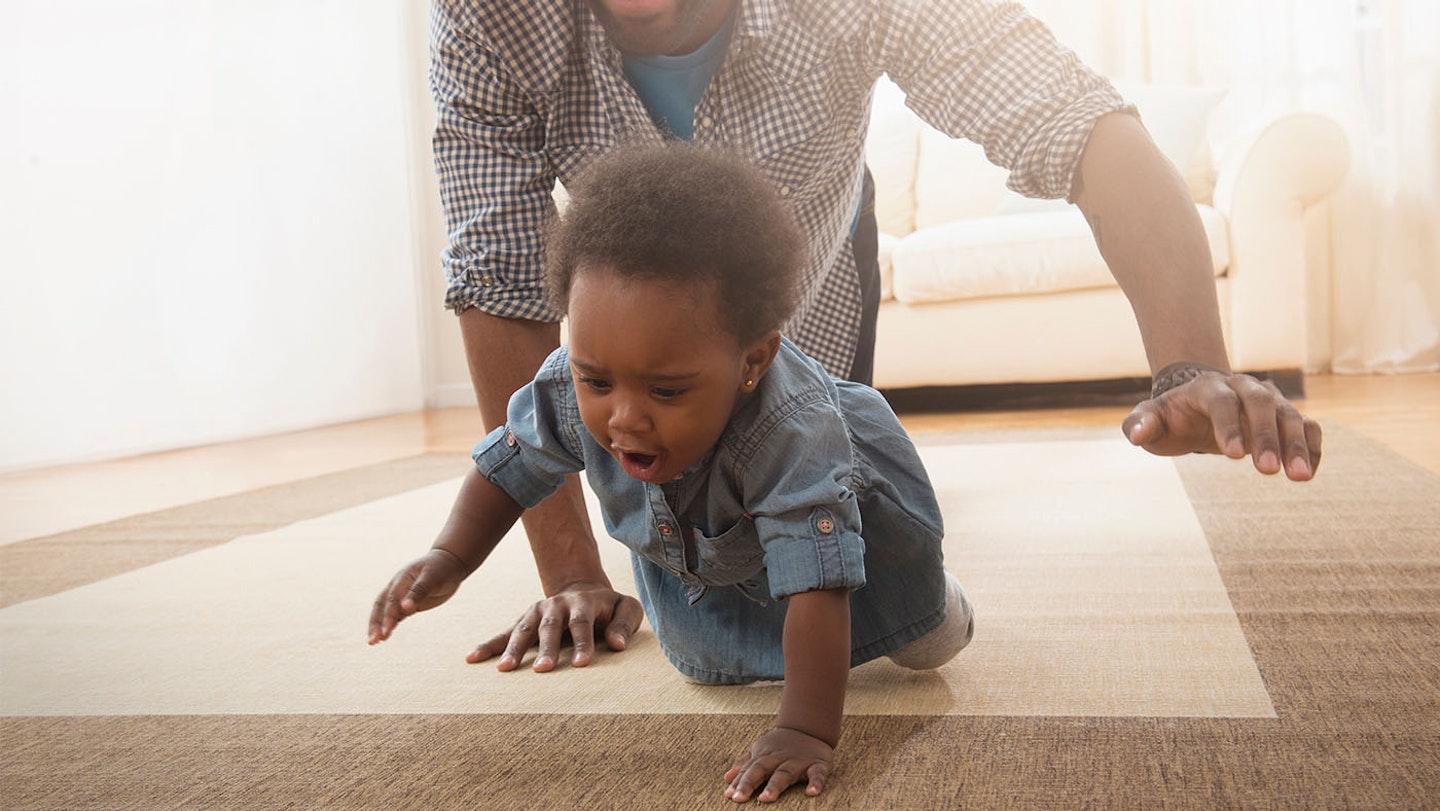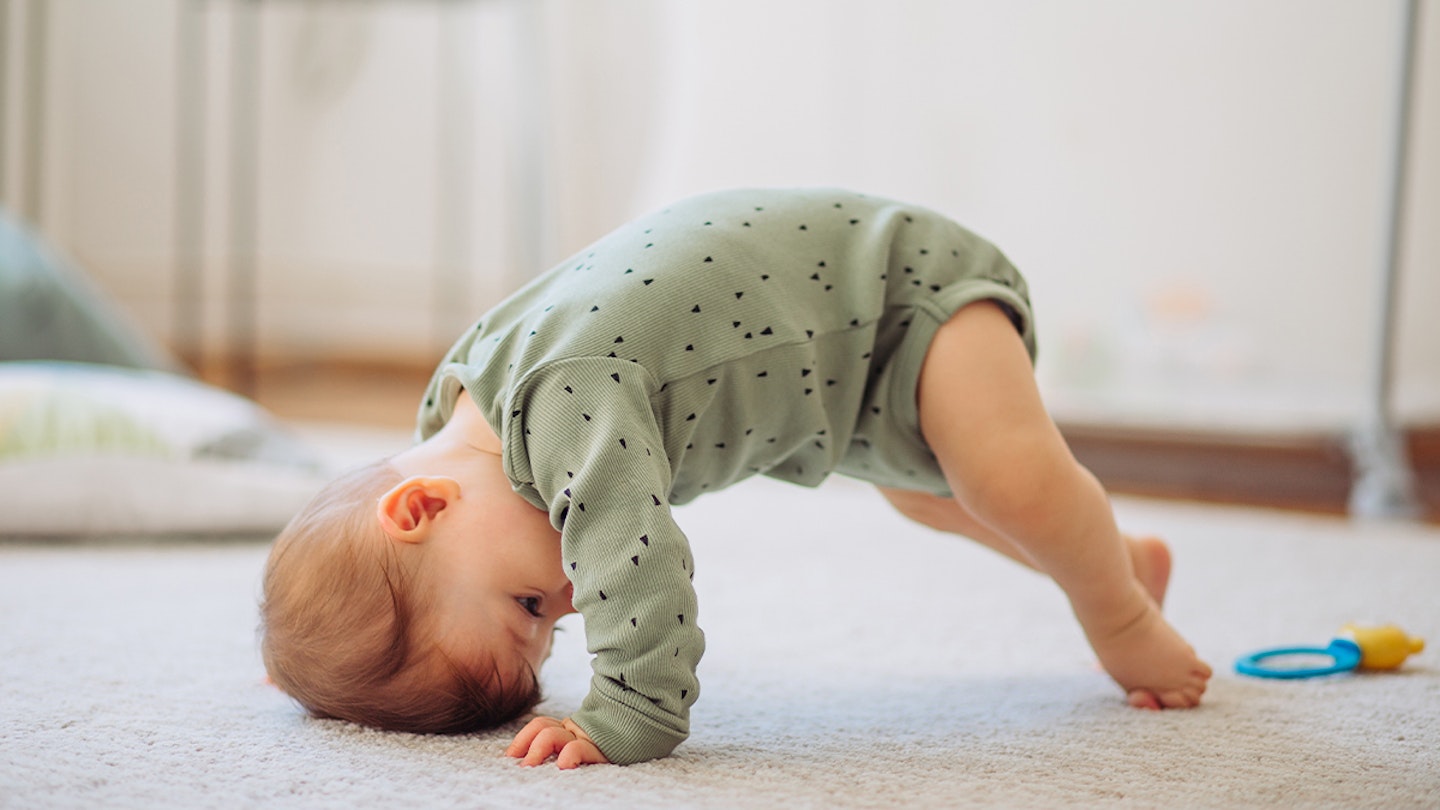And just like that, you have an 8-month-old baby on your hands. This month, your little bundle of joy will be reaching all sorts of exciting baby development milestones, from crawling to talking to an improved attention span. Your baby's language and social skills are coming on leaps and bounds, making playtime so much more fun but you'll definitely be kept on your toes.
As well as the fun and exciting milestones, there are a few not-so-nice milestones for your baby to conquer around the 8-month mark including the dreaded teething phase plus watching out for any signs of food allergies or sensitivities when introducing new foods to try.
We spoke to Dr Amanda Gummer, a psychologist specialising in child development, play and parenting to find out more about the development milestones and things we should be looking out for at 8 months.
Development milestones for 8-month-old baby
At 8 months old, babies are going through significant physical development. They are continuing to develop and refine their gross and fine motor skills, which will help them explore and interact with their environment more effectively.
Some of the physical milestones that may occur around this age include:
Crawling: Many babies start crawling between 6-10 months old, and by 8 months, many are able to crawl effectively.
Pulling to stand: Some babies can pull themselves up to a standing position by 8 months old, using furniture or other objects for support.
Sitting independently: By 8 months old, most babies can sit independently for periods of time without support.
Improved hand-eye coordination: Babies at this age are starting to develop better hand-eye coordination, which means they can reach for and grab objects more accurately.
8-month-old cognitive development
Some of the cognitive milestones that may occur around this age include:
Object permanence – Babies at this age are starting to understand that objects exist even when they are out of sight. This means that they may start to look for a toy that has been hidden or reach for an object that is just out of reach.
Increased attention span – At 8 months old, babies are starting to have a longer attention span and are able to focus on an object or activity for longer periods of time.
Improved problem-solving skills – Babies are starting to use trial and error to figure out how things work. They may try different methods to achieve a goal, such as reaching for an object or crawling towards a toy.
How much should 8-month-old babies be sleeping?
At 8 months old, most babies require about 14 hours of sleep per day, which includes both daytime naps and nighttime sleep. Typically, babies at this age will sleep for 9-11 hours at night and have 2-3 naps during the day. The duration of each nap can vary, but they usually last between 1-2 hours.
It's important to keep in mind that every baby is different and may have slightly different sleep needs. Some babies may require more or less sleep than average, and their nap schedules may vary.
How much should they be feeding and eating?
At 8 months old, most babies are consuming a combination of breast milk or formula and solid foods. The amount of breast milk or formula a baby needs can vary depending on their weight, activity level, and growth rate. As a general rule, most 8-month-old babies consume around 24-32 ounces of milk per day. If a baby is exclusively breastfed, they may be nursing 5-6 times per day. If a baby is formula-fed, they may be consuming 4-5 bottles per day.
In addition to breast milk or formula, most 8-month-old babies are starting to eat solid foods. At this age, babies are usually consuming 2-3 meals per day, with each meal consisting of a variety of nutrient-rich foods, such as pureed fruits and vegetables, whole grains, and protein sources like meats, beans, or tofu. The amount of solid food a baby needs can vary depending on their appetite and their growth rate. As a general guideline, most 8-month-old babies consume around 2-4 tablespoons of each type of food per meal. Over time, they will start to consume more solid foods and less milk. It's important to pay attention to a baby's hunger cues and adjust their feeding as needed.

{#h-8-month-old-cognitive-development}
How much should baby weigh and measure at 8 months old?
The average weight and length for a baby can vary depending on various factors, such as genetics, gender, and nutrition. However, here are some general guidelines for western European cultures:
Weight: The average weight for an 8-month-old baby is around 16-21 pounds (7.2-9.5 kg) for boys and 15-20 pounds (6.8-9.1 kg) for girls.
Length: The average length for an 8-month-old baby is around 26-29 inches (66-74 cm) for boys and 25-28 inches (63-71 cm) for girls.
It's important to remember that every baby grows and develops at their own pace, and there is a wide range of what is considered "normal" for weight and length.
8-month-old baby health
At 8 months old, there are several health-related factors that parents should be aware of including:
Teething: Many babies start teething around this age, which can cause discomfort, irritability, and changes in eating and sleeping habits. Some babies may also develop a low-grade fever, drool excessively, or have red, swollen gums.
Illnesses: Babies at this age are still developing their immune systems, so they may be more susceptible to illnesses such as colds, ear infections, and gastroenteritis.
Nutritional concerns: As babies start to eat more solid foods, it's important to offer a variety of nutrient-rich foods to ensure they are getting all the vitamins and minerals they need.
Things to think about at 8 months
There are several things parents can do to help aid their baby's development at this age, including:
Exploring and playing: Provide safe opportunities for them to explore and play, such as providing age-appropriate toys and setting up a safe play area.
Talk and read to a baby often: Pointing out objects and people around them. Additionally, reading to a baby can help with language development and provide a bonding experience.
Practice tummy time: Encourage tummy time throughout the day, and provide interesting toys and objects to keep a baby engaged, especially if baby is not yet crawling.
Healthy foods: Introduce new foods gradually and watch for any signs of food allergies or sensitivities.
Social interaction: Provide opportunities for social interaction, such as play dates with other babies or spending time with family members and friends.
About the expert
Dr Amanda Gummer is a psychologist, specialising in child development, play and parenting. Amanda has a PhD in Neuropsychology, the Postgraduate Certificate in Higher Education and over 20 years’ experience working with children and families. She is also the founder of The Good Play Guide.
